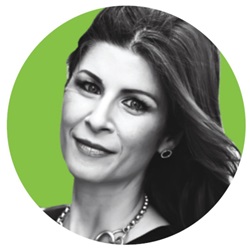 |
Deanna Burger (EMBA ’19)
Co-Founder, commUNITY Inc.
|
When the pandemic hit, my son and I moved in with my sister, her husband and their kids. One morning over breakfast, we were talking about how grateful we were to have the opportunities we have, and to be able to afford food and PPE and everything else we need. We decided to do something to help people who are not as fortunate. After a few phone calls, the three of us launched
commUNITY Inc., which makes high-quality, affordable masks and PPE-related lifestyle products.
The business did so well that within the first month, we needed to find a professional large-scale manufacturer. I reached out to Rocca Morra Hodge (Director of Career Services for Rotman’s Executive MBA Programs), and Jennifer Hildebrandt (Director of Alumni Engagement), who connected me with several alumni involved in different areas of retail, manufacturing, etc. That’s how I met Tim Gu, a fellow graduate of the EMBA program who is a large-scale manufacturer with factories in Toronto and China. From that moment on, Tim and his team have been amazing strategic partners.
Throughout this pandemic, we have sought opportunities to help society navigate the crisis. We started by donating $1 from every item we sold to Food Banks Canada. To date, we’ve been able to provide hundreds of thousands of meals nationwide. We have also donated face masks to a Niagara-based food bank; supported mental health initiatives and local women’s shelters across Canada; and were involved in a back-to-school donation drive to help provide backpacks and school supplies to students in need.
In spring 2021, we partnered with the Canadian Asian Gold Ribbon Campaign to help combat racism by donating $2 from every item we sell to support Asian well-being and mental health. We are proud to help bring awareness to the recent rise in anti-Asian sentiment. Last but not least, we’re working with an amazing group of corporate partners — including Sunnybrook Health Sciences Centre, the BC Schizophrenia Association and PC Health — to help them keep their employees, clients and customers safe.
Like most people, I’m hopeful masks won’t be necessary in most public places at some point. That being said, I also recognize there are many places where they should always be a no-brainer, like walk-in clinics, hospitals and the TTC. We’re keeping the company and our community engagement active while we explore different ways to create value.
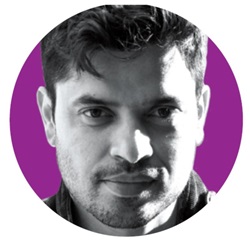 |
Avinash Raj (MBA ‘12)
RGD, MDes; Strategy and Service Design Lead, Canada Post
|
In the midst of the pandemic, my friend Ashok and I started looking for opportunities to serve local charities using our design expertise. We couldn’t find any, so we set out to fill this gap. In a survey, we confirmed that many designers are willing to donate their skills and time. So, in June 2020, we launched the
PAY IT FWD channel on
Slack. The lockdown had dealt a devastating blow to organizations driving positive social and environmental change, and
payitfwd.design gave our community of volunteer designers opportunities to pick up design projects posted by charities and work on them for free.
We now have a community of over 280 members consisting of designers and non-profits. We’ve completed numerous design, video and content-related projects for these non-profits, and we continue to work on more every week. Organizations we have worked with to date include Startup Woman, The Hummingbird Centre for Hope, LetsStopAIDS, Amakon Women Empowerment and Blink International. One of our most ambitious projects is a partnership with Studio.89, a non-profit that aims to provide creative outlets and learning opportunities for youth within the Peel Region. The goal
is to teach a graphic design course to five cohorts this year, so the students can create digitized art and tell their personal pandemic stories before they embark on the professional design world. The first two cohort of students have completed the course and we’re excited to start the next one soon. These young designers will also spend time at payitfwd.design working on active projects helping non-profits in the community — truly living up to our philosophy of paying it forward.
PAY IT FWD was inspired by the idea that there are lots of would-be ‘do-gooders’ out there who would love to make a difference in the world, but don’t have a platform. They don’t know who to reach out to or how to find opportunities to donate their skills. Looking ahead, we have ambitious goals to grow our community membership, execute more projects and become the go-to platform for designers to impact society via design.
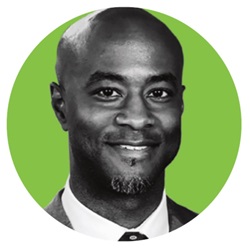 |
Tapfuma Musewe (GEMBA ‘20)
Managing Director, Raygan Mills; Founder, Eschaton Solutions and Afrifursa
|
Having lived and studied abroad, I knew first-hand that African culture and business opportunities were poorly understood outside of the continent. In particular, there was a lack of knowledge about Africa’s thriving agricultural and tech sectors. In 2017, I founded
Eschaton Solutions to help clients around the world access trade and investment opportunities in the region.
One of firm I worked with was a third-generation family business with roots in Cameroon called Raygan Mills. At the beginning of 2021, they decided to establish a private equity firm and invited me to join them as Managing Director. This has been a great way for me to continue to play a role in Africa’s economic development. Another way I am tackling this is through an organization I started last summer, Afrifursa (‘fursa’ means ‘opportunities’ in Swahili and Arabic), which organizes roundtable discussions on Africa’s growing sectors and rapid urbanization, shining a light on the experiences of ‘diasporans’ — individuals who live abroad but have deep ties to the continent. The focus on cities is really about highlighting sustainability and displaying the nuanced dimensions of Africa that are neglected when we treat it as a monolith.
In the wake of Black Lives Matter protests, I have reached out to a wide range of individuals about the importance of celebrating African ancestry. I have spoken to everyone from foodies to academics about why African cuisines have not been embraced in the same way as Chinese, Indian and other international cuisines have, and why the continent is so often associated with famine, despite supplying so much of the world’s food. More recently, we have been focused on building out programming that targets youth in the diaspora and on the continent. We are also planning events that will continue to bring together Canadian and African stakeholders to forge meaningful partnerships.
People don’t engage with what they don’t understand. My hope is that the more we talk about and focus on Africa in all of its nuance, the more its contributions and potential can be acknowledged.
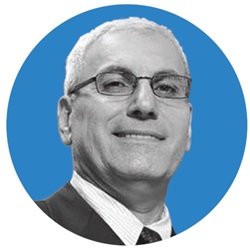 |
Ramy Elitzur
Associate Professor of Accounting, Rotman School of Management
|
Standard PCR tests for COVID-19 lead to many false negatives. As a result, clinicians are advised to treat any patient who displays clear signs of the virus as ‘infected’ — even if their test result is negative. The question is, Who should be re-tested? If the tested
group has low infection prevalence, the vast majority will (correctly) test negative. Thus, re-testing all negatives is inefficient.
My Rotman colleague Dmitry Krass, Tel Aviv University Professor Eyal Zimlichman and I developed a highly-accurate predictive model that allows for re-testing efforts to be focused on patients with a high probability of testing positive. Turnaround time has been another issue with COVID-19 tests, with people having to wait up to 48 hours for results. Such delays have harmful effects on contact tracing. Our tool — which is on a machine-learning algorithm — provides an accurate and instantaneous estimate of the probability of a positive PCR test for a given patient.
This tool is useful in several ways. First, it can help make more efficient use of limited testing resources by prioritizing the patients who are most likely to test positive, while screening away those who are likely to test negative. It can also be useful in obtaining instantaneous risk assessment when SARS-Cov-2 tests are either unavailable or the results are delayed, during which time appropriate medical intervention can be started for high-risk patients.
The machine-learning algorithms we developed demonstrate how predictive analytics tools can be harnessed to help combat a pandemic by rapidly identifying who has a high likelihood of infection, subsequently breaking the infection chain and ultimately saving lives down the chain. Such tools can help us get economies back on track by providing instantaneous and accurate estimates of the probability of infection for employees or customers. They can also help predict future hotspots for the virus, enabling more targeted and localized lockdowns.
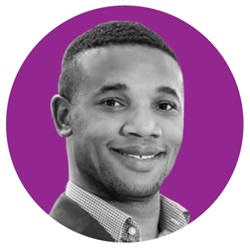 |
Frank Otabor (MBA ’21)
Senior Strategy Consultant, CIBC; Junior Fellow, Massey College
|
The Students Against Anti-Black Racism (SABR) COMMITTEE at the Rotman School is a student and faculty-led initiative that is tackling issues and challenges related to systemic racism — including anti-Black racism — impacting the Black, Indigenous and People of Colour (BIPOC) communities. SABR’s aim is to create an equitable learning environment free of stereotypes, gender discrimination and bias, where BIPOC feel empowered, heard and safe and there is equal opportunity for academic and career success.
| SABR’s Anti-Black Racism Equity Development Goals |
|
Goal 1: More Black representation on Rotman’s faculty, staff and administration.
Goal 2: Redesign Rotman programming to incorporate racial and gender diversity into all curricula, including (but not limited to) refinement of LDT and LPO courses, with the explicit teaching of
anti-Black racism, systemic racism, sexism and homophobia.
Goal 3: More intentional instruction and extracurricular programming on equity and interdependence, with an explicit focus on exploring the intersections of power and privilege.
Goal 4: Rotman’s Diversity and Inclusion (D&I) portfolio should communicate its mandate to students and train the student body on the governance around sensitive diversity topics.
Goal 5: Infuse a culture of equity, diversity and inclusion within the Rotman Student Club ecosystem.
Goal 6: Design more outreach and service-learning programming to connect students with equity-seeking and/or marginalized communities (e.g. BIPOC, LGBTQ+).
Goal 7: Focus the Orientation Program for incoming students on racism, equity and interdependence — with a specific focus on North American racism and anti-Black racism.
|
SABR executives have held productive meetings with (former) Interim Dean Ken Corts, senior leaders and Academic Area Coordinators at Rotman. After every meeting, we have felt that progress is being made — but also, that there is still a lot of work to be done to achieve the Anti-Black Racism Equity Development Goals.
For us, building back better will involve two stages: Achieving our Equity Development Goals and creating a sustainable system for diversity and inclusion. We envision a Rotman School environment where there are substantial numbers of Black professors and they feel included in the system, giving voice to Black students by expanding the curriculum to include more racial and gender-diverse content. Looking ahead, we hope for a system where the foundation of allyship is firmly in place to create an equitable learning environment free of stereotypes and discrimination.
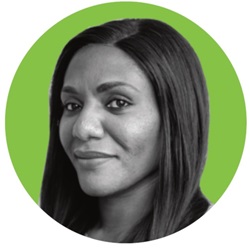 |
Chantal Chizea (MBA ’21)
SPE; Student Fellow, Institute for Gender and the Economy (GATE) @Rotman;
Author, Deepening Impact of COVID-19 on Women-Led SMEs in Africa
|
The
Rotman African and Caribbean Business Club (RACBC) is a group of African and Caribbean students that promotes diversity and inclusion within the Rotman community by fostering cross-cultural networking and social activities and leveraging shared cultural interests. Our official mission is to improve access, generate impact and conduct mentorship for members of the African and Caribbean community.
Our mentorship program is two-pronged: The first element is targeted at RACBC members, and the other is aimed at ‘paying it forward’. The program for our members creates mentorship opportunities for business professionals and recent Rotman graduates from the RACBC community. Mentors and coaches are matched with RACBC members based on the industry and functional interests of the respective club members.
The second aspect of the program is the Imani Tri-Mentorship program, whereby second-year MBAs volunteer as mentors alongside members of the Scotiabank Black Employees’ Network and Imani students from the University of Toronto, Scarborough, to mentor high school students. The aim is to contribute to growing the talent pipeline of Black students.
For RACBC, building back better will mean a community that is adequately connected and engaged. It will also mean designing programs with our members in mind. Before the pandemic, a primary challenge our members faced was establishing networks within corporate Canada. Going forward, our goal is to fortify our initiatives so that access to peers and mentors is not impacted by unfortunate events such as the global pandemic. There is a lot to learn from the experience that will be carried over into designing future events to grow and promote the club. Building back better will also mean making good on our club’s commitment to support members of the RACBC community.
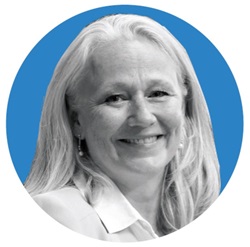 |
Susan Christoffersen
Dean and William A. Downe BMO Chair in Finance, Rotman School of Management
|
In the summer of 2020, the Rotman School’s senior leadership team took a hard look at what we must do going forward to address issues of discrimination and the underrepresentation of Black, Indigenous, and racialized persons among our students, faculty and staff. Led by then-Interim Dean
Ken Corts and Professor
Joanne Oxley, our priorities for the 2020-21 school year were to create opportunities to listen and hear about student experiences and concerns; support students impacted by racism; and deepen our efforts to combat racism and discrimination in all its forms.
We recognize that we need to increase the representation and visibility of Black instructors and alumni as well as increase Black representation in the content of our programs. We also need to increase Black student representation and outreach to build pathways for future students. I am pleased to say we have made progress on several fronts. Highlights include the appointment of three Black Executives-in-Residence to work with our faculty and students: Cornell Wright (JD/MBA ’00), Executive Vice President of Wittington Investments (the holding company of the Weston-Loblaw Choice Properties group); Nick Chambers, a Partner in the Social Impact Practice at Boyden Global Executive Search; and Ray Williams, Managing Director and Vice Chairman, Financial Markets at National Bank Financial.
We are now offering two new MBA elective courses focused on Black entrepreneurialism and business and we launched a new outreach event for prospective MBA students earlier this year. The inaugural Black Future Business Leaders Conference was held in February, attracting over 400 student registrants and top-tier corporate sponsors. We are also doubling-down on initiatives that will contribute to sustainable progress on this front, including a focused search for a senior Black or Indigenous faculty member; investing in the development of Black and Indigenous management scholars; and facilitating greater inclusion of cases and other course materials featuring diverse stories, particularly in our core courses. This is being spearheaded by Rotman’s Equity Diversity and Inclusion (REDI) committee, led by Assistant Professor Nouman Ashraf. Our colleagues up the street at Rotman Commerce are on board with these efforts and will have further success stories to tell.
To be clear, our work is far from done. This will be an ongoing effort requiring continuous oversight and attention. But I am hopeful that working together, our faculty, staff and students will do what is necessary to build back better.
Share this article: